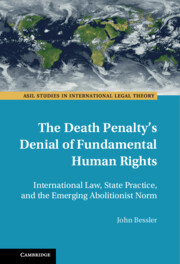 The Death Penalty's Denial of Fundamental Human Rights
The Death Penalty's Denial of Fundamental Human Rights State Practice, International Law, and Global Progress
Published online by Cambridge University Press: 01 December 2022
This chapter traces the history of the world's anti-death penalty movement, noting how countries moved away from punishments such as breaking on the wheel and burning at the stake and how capital punishment has been abolished or curtailed in various countries and American states. After taking note of early successes of the abolitionist movement, the chapter discusses abolitionist efforts over time, including in the Progressive Era and in the post-World War II period (e.g., in Europe and the Americas). In particular, the chapter discusses American states (i.e., Michigan, Wisconsin and Rhode Island) that abolished capital punishment before the American Civil War, and describes how West Germany outlawed capital punishment in its constitution in 1949. The chapter discusses how international human rights law has evolved in the post-World War II period, with capital punishment coming under increased scrutiny and protocols to international and regional human rights conventions (e.g., the Second Optional Protocol to the International Covenant on Civil and Political Rights, Protocols 6 & 13 to the European Convention on Human Rights) abolishing or restricting the death penalty's use.
To save this book to your Kindle, first ensure [email protected] is added to your Approved Personal Document E-mail List under your Personal Document Settings on the Manage Your Content and Devices page of your Amazon account. Then enter the ‘name’ part of your Kindle email address below. Find out more about saving to your Kindle.
Note you can select to save to either the @free.kindle.com or @kindle.com variations. ‘@free.kindle.com’ emails are free but can only be saved to your device when it is connected to wi-fi. ‘@kindle.com’ emails can be delivered even when you are not connected to wi-fi, but note that service fees apply.
Find out more about the Kindle Personal Document Service.
To save content items to your account, please confirm that you agree to abide by our usage policies. If this is the first time you use this feature, you will be asked to authorise Cambridge Core to connect with your account. Find out more about saving content to Dropbox.
To save content items to your account, please confirm that you agree to abide by our usage policies. If this is the first time you use this feature, you will be asked to authorise Cambridge Core to connect with your account. Find out more about saving content to Google Drive.